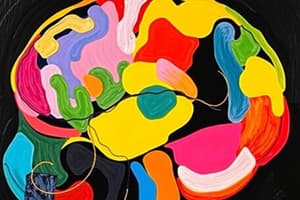Podcast
Questions and Answers
What motivates O'Brien's character to avoid fleeing to Canada?
What motivates O'Brien's character to avoid fleeing to Canada?
Fear of being shamed before one's peers
What does Jimmy Cross carry in addition to physical items during the war?
What does Jimmy Cross carry in addition to physical items during the war?
- Fear and guilt
- Maps and compasses
- Love and comfort
- All of the above (correct)
The psychological burdens carried by soldiers after the war are often trivial.
The psychological burdens carried by soldiers after the war are often trivial.
False (B)
The things that O'Brien's characters carry include both physical and __________ burdens.
The things that O'Brien's characters carry include both physical and __________ burdens.
What is O'Brien's aim in blending fact and fiction in his stories?
What is O'Brien's aim in blending fact and fiction in his stories?
Match the character to their emotional burden:
Match the character to their emotional burden:
Flashcards are hidden until you start studying
Study Notes
Fear of Shame as Motivation
- O'Brien's experiences illustrate how fear of shame drives soldiers' decisions in war.
- "On the Rainy River" reflects O'Brien's moral conflict over fighting in an unjust war versus appearing cowardly.
- The motivation to fight stems more from social pressures than patriotism, highlighting the tension between personal beliefs and societal expectations.
- Soldiers may engage in absurd or dangerous acts to maintain social acceptance, as seen with Curt Lemon’s unnecessary dental procedure to combat shame.
- Jimmy Cross embodies confusion and uncertainty as a leader, reflecting how peer influence complicates decision-making in war.
- Fear of shame is depicted as a misguided yet unavoidable catalyst for participation in conflict.
Physical and Emotional Burdens
- The "things" carried by soldiers encompass both tangible items and emotional weights such as grief, fear, and longing.
- Each character's physical load parallels their emotional strain, demonstrating the interplay between mental and physical challenges.
- Henry Dobbins carries pantyhose symbolizing his desire for love, while Jimmy Cross bears compasses indicating his leadership responsibilities.
- Soldiers conceal their fear to avoid vulnerability, creating further emotional turmoil.
- The psychological effects of war persist after combat, with survivors grappling with experiences of guilt and loss.
- Norman Bowker’s struggle illustrates the deep psychological scars of war, culminating in isolation and tragic outcomes.
The Subjection of Truth to Storytelling
- O'Brien's use of his own name and real characters blurs the line between truth and fiction, complicating readers' understanding of events.
- The narrative structure involves contradictions that challenge the reliability of each character's account.
- O'Brien emphasizes storytelling over objective truths, asserting that the significance of war stories lies in their emotional impact rather than factual accuracy.
- The exploration of subjective truth reveals the profound changes war inflicts on soldiers, transcending mere historical recounting.
- Diverse voices, notably Rat Kiley and Mitchell Sanders, convey the complexities of war's truths, suggesting that some experiences defy straightforward explanation.
Studying That Suits You
Use AI to generate personalized quizzes and flashcards to suit your learning preferences.




